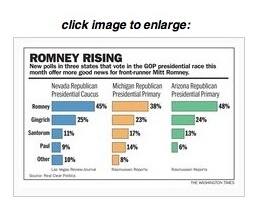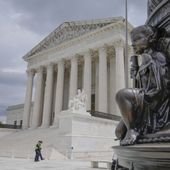TONOPAH, Nev. — Nevada fought hard to be the first Western state to vote in the Republican presidential primary, offering the chance to break out of East Coast issues and let candidates hone their appeals to the Wild West on everything from water rights to nuclear energy.
But so far, that just hasn’t happened.
Instead, the battlefield here looks the same as it did back East: questions of character, attempts to capitalize on one another’s gaffes, and the usual assortment of attacks on President Obama’s time in office.
“The candidates are ignoring Western issues like land usage,” said Richard Disney, a Reno businessman and tea party organizer. “Nevada, where I live, 86 percent of all land in Nevada is owned by the federal government and regulated by the Department of Interior. Water issues are huge, energy issues are huge, and they’re ignoring that.”
That’s odd for a state that prides itself on its independence, and which spawned the Sagebrush Rebellion of the 1970s and 1980s, when ranchers and miners fought back against what they saw as an overbearing government trying to end land-use agreements dating back more than a century.
Mr. Disney and others said there are votes to be had for the asking on such issues as the Clean Air, Clean Water and Endangered Species acts, particularly in the state’s rural west and north, but nobody’s doing much asking.
Instead, the campaigns are running ads focused on broad national issues of leadership and the economy and social issues, and spend their speeches hashing out the same questions as in Florida, which voted earlier this week.
Nevada used to be a middle-of-the-pack state until the last decade, when it decided it wanted a more prominent position in the presidential election process. Democrats pushed it high on their schedule in 2004 and again in 2008, when the Republicans followed suit. In 2008, former Massachusetts Gov. Mitt Romney won the state’s caucus-vote easily, but since they happened on the same day as South Carolina’s primary, the results were overshadowed.
This time, Nevada had been slated to go fourth, but Florida broke Republican Party rules and moved up its primary, forcing the other states to scramble. Nevada had threatened to hold its caucuses in mid-January, but relented and took the fifth slot behind Florida.
Many Republicans here blame the party for not holding its ground, and say the lack of attention from the candidates is the natural result of the tight schedule.
The caucuses come just four days after Florida’s primary and are followed quickly by caucuses in Minnesota and Colorado on Tuesday. Missouri holds a primary on Tuesday and Maine voters caucus from Feb. 4 to Feb. 11.
With all the competition, candidates are splitting their time among the four states. Former Sen. Rick Santorum has only briefly touched down in Nevada this week, while former House Speaker Newt Gingrich and Mr. Romney have put in a little more time.
Besting all of them is Rep. Ron Paul of Texas, who has visited here regularly and has tailored his pitches.
On Wednesday, he laid out an economic agenda that the Las Vegas Sun said at times “seemed to be speaking directly to the problems of the local audience” when he proposed loosening tourist visas and ending taxation of income from tips — both big issues in a state that depends heavily on tourism and hospitality.
Mr. Paul also addressed land-use issues, saying he wants to see the federal government return property to the states.
Other candidates have been given the chance to address local issues but took a pass.
Mr. Disney said he attended Mr. Gingrich’s appearance in Reno on Wednesday and said several of the questions from the audience lent themselves to West-specific answers, but Mr. Gingrich stuck to national-audience talking points instead.
“That’s just a lack of homework about the issues,” said Eric Herzik, chairman of the political science department at the University of Nevada, Reno, who said Mr. Gingrich has shown he lacks a good organization here.
That was underscored Wednesday when Mr. Gingrich canceled a meeting with Nevada Gov. Brian Sandoval and also pushed his Reno appearance, which had been scheduled for noon, back to 1 p.m., making him too late for the mid-day news programs, which had planned to carry him live at noon.
Mr. Gingrich’s campaign didn’t respond to requests for comment.
One Western issue that is getting attention is immigration. While Hispanics made up a chunk of Florida’s primary electorate, those were mostly Cuban-Americans who benefit from special immigration rules.
Out West, where Central Americans predominate, the issue is more pointed, and Hispanic voters here say they favor some sort of legalization program for illegal immigrants. However, the candidates oppose legalization to varying degrees, and established those views in Iowa and South Carolina, where voters generally wanted a stricter approach.
Mr. Herzik said, on immigration and other issues, Nevada’s value to the process is bringing a different set of eyes to view the field of candidates.
“The electorate is slightly different out here,” Mr. Herzik said. “Nevada is not a social-conservative state. The religious right that you get, particularly in Southern states, that’s not what Nevada Republican politics is about.”
In fact Mr. Romney, who as a Mormon has faced repeated questions about his religion in Iowa and South Carolina, likely benefits from that identification in a state where Mormons are expected to make up about one-fifth of Republican caucusgoers.
“We’re farther away from Washington, D.C., so Mitt Romney being a businessman, in particular his experience [running the 2002 Winter Olympics] in Utah, is a plus. Newt Gingrich is the Washington insider,” Mr. Henrik said.
In the previous four states — Iowa, New Hampshire, South Carolina and Florida — Mr. Gingrich and the other candidates weren’t shy about touching on local concerns.
Mr. Santorum bragged to Iowans that he wrote his economic plan with their manufacturing situation in mind, and all of the candidates had ready-made agriculture answers at the ready.
In South Carolina all of the candidates promised if elected they would halt the federal government’s lawsuit against the state’s immigration law, and would approve a voter-identification law that the Obama administration has halted.
Mr. Gingrich took it a step further in South Carolina, promising to support an interstate highway through the eastern part of the state, and then in Florida promising to boost the U.S. space program, which he said would aid that state’s economy. His grasp of local issues was so deep it irked Mr. Romney, who lashed out at one of the debates in Florida last week.
“Look, this idea of going state to state and promising what people want to hear, promising billions, hundreds of billions of dollars to make people happy, that’s what got us into the trouble we’re in now,” Mr. Romney said.
“I thought we were a country where one of the purposes of candidates going around was to actually learn about the states they campaigned in, and actually be responsive to the needs of the states they campaigned in,” Mr. Gingrich responded.
• Stephen Dinan can be reached at sdinan@washingtontimes.com.



Please read our comment policy before commenting.